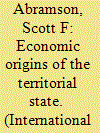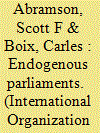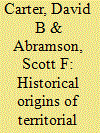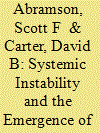|
|
|
Sort Order |
|
|
|
Items / Page
|
|
|
|
|
|
|
| Srl | Item |
| 1 |
ID:
152329


|
|
|
|
|
| Summary/Abstract |
This paper challenges the long-standing belief that changes in patterns of war and war making caused the emergence of large territorial states. Using new data describing the universe of European states between 1100 and 1790, I find that small political units continued to thrive well into the “age of the territorial state.” Some scholars have argued that changes in the production of violence led to the dominance of geographically large political units during this era. In contrast, I find evidence that variation in patterns of economic development and urban growth caused fragmented political authority in some places and the construction of geographically large territorial states in others. Exploiting random climatic deviations in the propensity of certain geographical areas to support large populations, I show via an instrumental-variables approach that the emergence of towns and cities caused the formation of small and independent states.
|
|
|
|
|
|
|
|
|
|
|
|
|
|
|
|
| 2 |
ID:
169320


|
|
|
|
|
| Summary/Abstract |
Institutional constraints on executive behavior are commonly understood to be crucial constitutional features that limit state expropriation, protect property rights, and promote economic development. Combining new data describing the presence of parliamentary constraints for the entire European continent with data on city sizes, we build upon theories of endogenous economic growth to demonstrate that paths of both economic and political development over the long span of European history from 1200 to 1900 are the consequence of a common process of urban agglomeration. In doing so, we provide evidence that both outcomes—the existence of constraining institutions and growth—are driven by initial conditions that fostered technical know-how embodied in urban-dwelling artisans who, in turn, were able to force institutional limits on rulers’ actions. Hence, instead of reflecting a true underlying cause of development, parliamentary constraints are themselves outcomes determined by an endogenous process of growth.
|
|
|
|
|
|
|
|
|
|
|
|
|
|
|
|
| 3 |
ID:
186687


|
|
|
|
|
| Summary/Abstract |
Political borders profoundly influence outcomes central to international politics. Accordingly, a growing literature shows that historical boundaries affect important macro-outcomes such as patterns of interstate disputes and trade. To explain these findings, existing theories posit that borders have persistent effects on individual-level behavior, but the literature lacks empirical evidence of such effects. Combining spatial data on centuries of border changes in Europe with a wide range of contemporary survey evidence, we show that historical border changes have persistent effects on two of the most politically significant aspects of behavior: individuals’ political and social trust. We demonstrate that in areas where borders frequently changed, individuals are, on average, less trusting of others as well as their governments. We argue that this occurs because border changes disrupt historical state-building processes and limit the formation of interpersonal social networks, which leads to lower levels of trust.
|
|
|
|
|
|
|
|
|
|
|
|
|
|
|
|
| 4 |
ID:
149672


|
|
|
|
|
| Summary/Abstract |
Given the abundance of evidence that disputed territory matters, we know remarkably little about the origins of territorial claims. We argue that the presence of competing historical border precedents is central to the emergence of territorial claims. We outline why precedents provide opportunity to make claims and provide two possible explanations for why leaders have incentive to claim along precedents. One possibility is consistent with the conventional wisdom that incentive derives from territorial characteristics such as natural resources or strategic significance. A second and more novel explanation is that the persistent coordination effects of historical boundaries provide the incentive to draw claims along them. We use new data on the location of historical boundaries from the peace of Westphalia until the start of the French Revolution to show that historical border precedents drive the emergence of territorial claims after the Congress of Vienna and that persistent coordination effects provide incentive to dispute historical precedents.
|
|
|
|
|
|
|
|
|
|
|
|
|
|
|
|
| 5 |
ID:
175286


|
|
|
|
|
| Summary/Abstract |
We develop and estimate a model of learning that accounts for the observed correlation between economic development and democracy and for the clustering of democratization events. In our model, countries’ own and neighbors’ past experiences shape elites’ beliefs about the effects of democracy on economic growth and their likelihood of retaining power. These beliefs influence the choice to transition into or out of democracy. We show that learning is crucial to explaining observed transitions since the mid-twentieth century. Moreover, our model predicts reversals to authoritarianism if the world experienced a growth shock the size of the Great Depression.
|
|
|
|
|
|
|
|
|
|
|
|
|
|
|
|
| 6 |
ID:
177784


|
|
|
|
|
| Summary/Abstract |
Although evidence shows that territorial disputes fundamentally shape relations among states, we know surprisingly little about when territorial claims are made. We argue that revisionist states have incentives to make territorial claims when the great powers that manage the system are in crisis. We identify five main sources of systemic instability and develop measures of each of them, demonstrating that the majority of territorial claims in Europe are drawn at times when regional great powers are embroiled in crisis, for example, 1848 or 1870 during the nineteenth century. The claims that emerge at these times are not necessarily among states involved in the crises that generated turmoil (e.g., Prussia and France in 1870). We use a newly developed spatial measure of historical boundary precedents in Europe from 1650 to 1790 to demonstrate that the effect of this known spatial correlate of where claims are drawn matters only when the European system is in crisis. We further demonstrate that this claim-timing pattern is general to the global system of states. In the appendix we corroborate our explanation of our findings with a detailed case study of the territorial claims that led to the contemporary Italian state's formation.
|
|
|
|
|
|
|
|
|
|
|
|
|
|
|
|
|
|
|
|
|